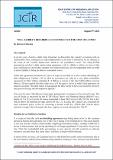| dc.contributor.author | Mwaba, Bernard | |
| dc.date.accessioned | 2023-08-08T13:31:16Z | |
| dc.date.available | 2023-08-08T13:31:16Z | |
| dc.date.issued | 2023-08-08 | |
| dc.identifier.uri | https://hdl.handle.net/20.500.14274/1802 | |
| dc.description.abstract | In recent years, Zambia’s debt crisis threatened to destabilise the country's economy with an undesirable effect, leading to an unprecedented rise in the cost of livelihood for its citizens as the value of the Kwacha depreciated. Under the debt restructuring agreement (reached after years of negotiations that led to the country defaulting on debt obligations), Zambia is able to restructure its debt in a way that reschedules repayment for $6.3 billion including $1.3 billion in arrears of the total $18.6 billion external debt in a 20-year period (the first three years a grace period in which only payments on interests are due). This deal makes it manageable for the country to focus on economic recovery and growth through the development agenda. But what are the implications of this deal on the cost of living for the ordinary Zambian? | en |
| dc.publisher | Jesuit Centre for Theological Reflection | en |
| dc.rights | Attribution-ShareAlike 3.0 United States | * |
| dc.rights.uri | http://creativecommons.org/licenses/by-sa/3.0/us/ | * |
| dc.subject | Cost of Living | en |
| dc.subject | Debt | en |
| dc.subject | Debt Restructuring | en |
| dc.title | Will Zambia's Rescheduled Debt Reduce the Cost of Living? | en |
| dc.title.alternative | Implications of Debt Restructuring on the Cost of Living Crisis | en |
| dc.type | Article | en |

